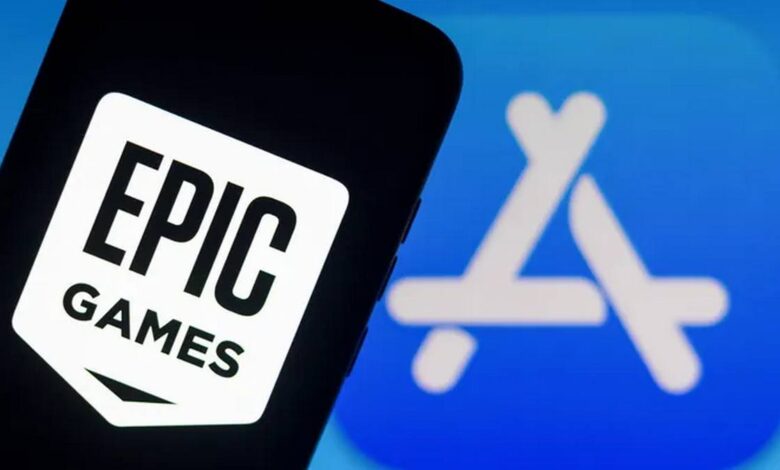
The long-running feud between game developer Epic Games and tech giant Apple has just flared up again. Epic Games has filed a fresh lawsuit against Apple, this time accusing the tech titan of deliberately creating roadblocks for developers seeking to implement alternative payment options on the App Store.
This bold move revives the debate surrounding Apple’s control over in-app payments and their substantial 30% commission levied on every transaction.
The Roots of the Conflict
To understand the significance of this renewed legal skirmish, it’s essential to grasp the context.
Apple’s App Store, the sole gateway for applications on iPhones and iPads, operates with stringent policies. Developers are mandated to use Apple’s integrated payment processing system for all in-app purchases, and Apple collects a 30% cut of those earnings.
Epic Games, known for the wildly popular battle royale game Fortnite, challenged this system in 2020. In a calculated gamble, Epic introduced its own payment system within Fortnite, bypassing Apple’s and offering a discount to players who chose the alternative option.
The response from Apple was swift and decisive. Fortnite was removed from the App Store for violating its terms of service, sparking a legal battle that captivated the tech industry.
The initial court ruling offered a mixed verdict. While the judge declared that Apple could not ban Unreal Engine, a game development software tool created by Epic Games, it upheld Apple’s right to remove Fortnite.
Crucially, as part of the ruling, the court ordered Apple to allow developers to offer alternative ways to process in-app payments by December 2021, a move designed to increase competition and choice.
Also see: Apple’s iPhone 15 Ad: “Lots of Storage” Claim Raises Eyebrows

Epic Fights Back: Apple’s “Obstacles”
It’s this last part of the court order that sits at the core of the new lawsuit. Epic Games alleges that instead of willingly complying with the directive, Apple has created unnecessary hurdles designed to discourage developers from pursuing alternative payment routes.
According to Epic, these barriers range from complex technical requirements to user-unfriendly pop-ups that warn users about the alleged risks of utilizing third-party payment systems.
These tactics, Epic Games asserts, make the process so cumbersome that it effectively nullifies the intent of the court ruling.
Implications: A Potential Domino Effect
Should Epic Games prevail in this latest legal maneuvering, the consequences for the mobile app landscape could be profound. Here’s why this matters:
- Apple’s Fees Under Fire: A victory for Epic could compel Apple to lower its 30% commission, allowing developers to keep a larger portion of their hard-earned revenue.
- Benefits for Consumers: Lower developer fees could translate into reduced in-app purchase prices for users across games, subscriptions, and other digital goods within apps.
- A More Open Marketplace: The outcome may erode Apple’s near-monopoly on app distribution and in-app payments, paving the way for potential competitors and giving developers more options.
- Privacy and Payment Security Questions: Apple will likely argue that alternative payment systems pose a significant risk to the privacy and security of its users, as Apple can’t fully vet these external options.
The Long Game: Epic’s Unwavering Resolve
Epic Games’ continuous legal crusade against Apple underscores an increasingly widespread sentiment among a segment of developers. They believe that the current App Store model, while offering benefits like discoverability and perceived security, comes with too steep a price.
Epic isn’t alone in this sentiment; companies like Spotify have also openly criticized Apple’s fees and control. This growing discontent is fueling a push for a fairer and more diverse app ecosystem. According to Reuters.com, Meta, Microsoft, X and Match have joined this battle too!
Apple’s Stance: Safety and a Premium Experience
Apple has historically defended its approach as essential for maintaining a safe, consistent, and high-quality experience for its users.
The company highlights its efforts in curating the App Store, reviewing applications, and ensuring secure transactions.
It’s likely that Apple will stress that fragmenting its system will not only jeopardize user security but also undermine the substantial resources it has poured into the App Store infrastructure.
The Verdict? A Long Way to Go
The courts will once again be the venue where this high-stakes battle plays out, and the outcome is far from certain.
Epic Games’ unwavering challenge spotlights a fundamental tension in the app market – the balance between providing a curated experience that benefits users and maintaining fair practices for developers who create the experiences that draw users in.
Regardless of the eventual ruling in this lawsuit, one thing is clear: the ripple effects of this fight will be felt for years to come, redefining the dynamics between app stores, developers, and consumers.



